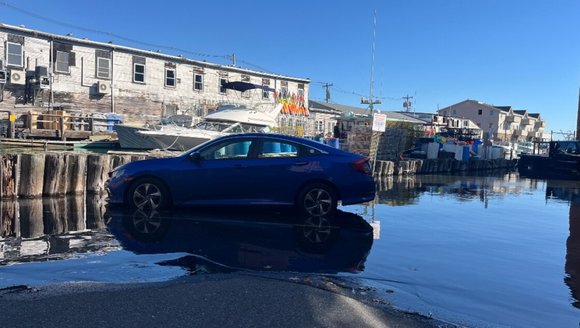Municipal Climate Action Program
Supporting coastal communities in the face of climate change.
The Municipal Climate Action Program (MCAP) engages coastal communities to support better understanding of local sea level rise impacts and provide them with knowledge, skills, and tools they need to develop community-focused and data-driven resilience plans to thrive in a warming world.
Program Goals:
- Build capacity in rural communities to develop data- and community-informed coastal resilience plans.
- Provide coastal communities with tools and resources to visualize and document coastal flooding impacts and to engage and educate community members.
- Make it easy for people to contribute their own observations that will help pinpoint high-risk flooding areas in their communities.
MCAP Projects
Explore the different ways in which we work to support coastal communities.
-
![Community Resilience Training]()
Community Resilience Training
Community Resilience Training supports Maine’s rural coastal communities in increasing their capacity to plan and prepare for coastal climate impacts by developing the knowledge, skills, …
-
![Coastal Flooding Community Science]()
Coastal Flooding Community Science
Our coastal flooding project provides local residents with guidance on how to contribute observations that will help pinpoint high-risk flooding areas in our communities. Community …
-
![Mapping Coastal Community Flood Hazards]()
Mapping Coastal Community Flood Hazards
To help coastal residents learn more about the impacts of coastal flooding and sea level rise, we partnered with the City of South Portland to …
-
![Preparing Communities for Sea Level Rise]()
Preparing Communities for Sea Level Rise
Whether directly or indirectly, we will all feel the impacts of continued sea level rise. In order to build resilient communities that can adapt and …
-
![Ecosystem Investigation Network]()
Ecosystem Investigation Network
The Ecosystem Investigation Network supports field-based, collaborative research into climate-driven changes happening in the Gulf of Maine and its watershed. Our goal is to bring …
-
![Assessing Coastal Flood Risk with Maine Communities]()
Assessing Coastal Flood Risk with Maine Communities
The Gulf of Maine Research Institute is partnering with the coastal Maine communities of Machias, Saint George, Boothbay Harbor, and Portland to collect local water …
-
![Climate Smart Working Waterfronts]()
Climate Smart Working Waterfronts
We are working with Kittery, Portland, Tremont, and Lubec to establish a statewide model approach for working waterfront climate planning, that can be used by …
With over 5,000 miles of tidal coastline, and some of the most rural regions in the nation, Maine’s coastal communities face unique challenges in addressing the impacts of climate change. Maine’s vulnerability to coastal flooding from sea level rise, storm surge, and extreme precipitation is exacerbated by its significant economic dependence on the ocean economy.
Our Climate Center's Municipal Climate Action Program, led by Gayle Bowness, is taking steps to support these coastal communities with localized data and strategies that will help them address their climate risks.










